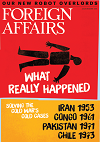On November 13, 1970, a devastating cyclone struck East Pakistan, a province dominated by the Bengali ethnic group and physically separated from the rest of Pakistan by India. The cyclone killed an estimated 230,000 people, and in its wake, the national government, based in West Pakistan, did too little to alleviate the suffering, further alienating the long-underrepresented Bengalis.
A year later, they would declare independence. As an officer in the U.S. consulate in the East Pakistani capital of Dhaka later noted, “The cyclone was the real reason for the final break.” Several weeks after the cyclone, on December 7, Pakistan held the first direct elections in its 23-year history. East Pakistan went for Mujibur Rahman, who headed a Bengali nationalist party called the Awami League, which was moderately pro-American. Sheik Mujib, as he was known, initially favored autonomy for both wings of Pakistan in a confederation. West Pakistan elected another nationalist, Zulfiqar Ali Bhutto. He threatened to unseat the military government under General Agha Muhammad Yahya Khan, who was commonly referred to as Yahya. Because East Pakistan was more populous than West Pakistan, the Awami League won a substantial majority of the seats in the new national parliament, and Mujib stood to become prime minister of the entire country. Yahya had no interest in losing East Pakistan, and as negotiations among himself, Bhutto, and Mujib went nowhere, he postponed the opening of the National Assembly, which had been scheduled for March 3, 1971. Feeling that the fruits of their electoral victory had been stolen from them, the people of East Pakistan poured into the streets and then launched a general strike. Archer Blood, the U.S. consul general in Dhaka, reported to the State Department: “I’ve seen the beginning of the breakup of Pakistan.” Yahya banned the Awami League, ordered Mujib’s arrest, and oversaw a brutal military crackdown that involved the systematic massacre of some 200,000 defenseless citizens and sent more than six million Bengalis fleeing across the Indian border.
This article was originally published by Foreign Affairs. You can read the rest of the article here.
You can read exclusive content from Gateway House: Indian Council on Global Relations, here.
Copyright © 2014 by the Council on Foreign Relations, Inc.


